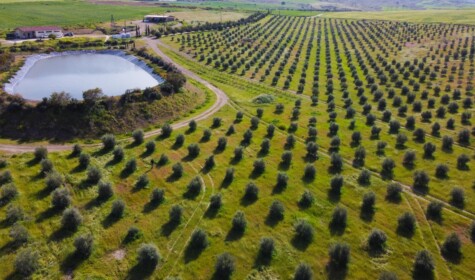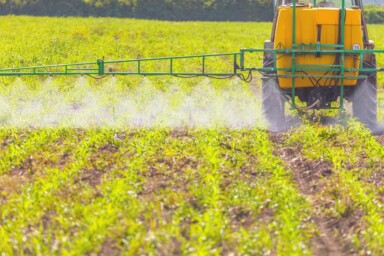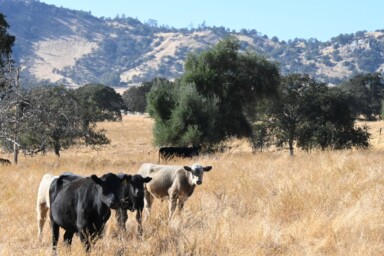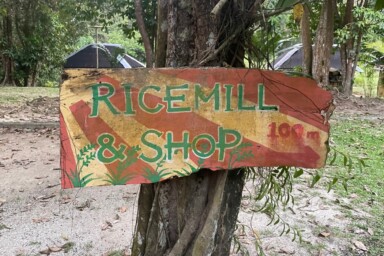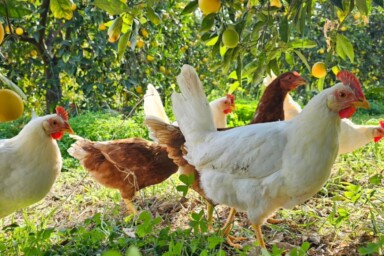The ‘Kalamon’ olive variety, also known as Kalamata, typically has higher levels of healthy, phenolic compounds than other types of olives.
That’s not to say there aren’t significant challenges – there are.
“To me,” says Panteli, “organic farming is like gambling: sometimes, you play by the rules and you win; other times, you play by the rules and you lose.” Dealing with the increasingly extreme weather changes throughout the seasons are times when you often “lose”.
Cyprus has had extremely little rain this summer, which is nothing new. There were also devastating wildfires and challenging heat waves that, again, came as little surprise to many here.
“The heat is no problem, the olives can handle it,” says Nicolas Netien, an environmental engineer and organic farming expert, who was one of the founders of Atsas Organics. “The problem now, though, is the change of patterns. Things are becoming less and less predictable or reliable, and so you need systems that are more adaptable and resilient.”
From one year to the next, it’s becoming harder and harder to predict what will happen. Winter rains not arriving and then snow coming in spring (when flowering should be taking place), followed immediately by intense heat announcing itself a month earlier than it usually does (and staying around twice as long), have had a straining effect on the olives this year.
Heavy winter rains also meant lots of undergrowth developed in the predominantly pine forests, which acted as kindling for summer fires – a problem that Netien says can be mitigated by more sophisticated agroforestry projects, using ancient oak and cedar species (rather than pyrophytic pine trees) interspersed with other species, controlled animal grazing and recreational human activities.
Netien is currently involved with various larger-scale, multi-party projects across Cyprus, aimed at pushing the island’s land management and food production systems towards a more sophisticated, sustainable direction.
“What we really need is a cultural change,” he says. “We need to put food production back at the centre of society, where it belongs. We have an outdated view on farming. We think it has to be difficult, but it doesn’t. We are not breaking our backs – it’s not the Middle Ages. We have technology we can use. We have modern systems.”
However, as in many other countries, young people in Cyprus are turning away from agriculture towards more attractive or prosperous careers in the city, while the older generations – who have traditionally cared for the trees and worked the land – move on.
“Fifty-one per cent of land in Cyprus is in ‘critical danger of desertification’ due primarily to man-made actions, according to the UN; and 80% of farm holdings are run by people aged over 65. So, we have a big demographic problem looming,” says Netien. “What really drives people like me insane though – literally – is that we already have the solutions: we know how we can do it, and we have the tools. We just need the willpower.“
There aren’t many job opportunities for young Cypriots, like Anastasia, in rural areas like this. Cultural and family traditions are disappearing as older generations pass on. The olive oil produced at Atsas is different from traditional Cypriot olive oil, too – Atsas sells most of its high-end oil as a nutraceutical nutritional supplement on the international market. In the UK, for example, a 100 ml bottle of their high-phenolic oil fetches £23 online. They also bottle and package more ‘table’ olive oil (which is still very high in polyphenols) for both export and local Cypriot markets.
“For me,” says Anastasia, wrinkling her face at the taste of that world-leading, USD$300-per-litre oil she has just tasted, while guiding me through the different products, “I prefer the other one, the local one. It is more smooth, more…tasty. But for the last three years, I have been trying to get used to this one.”
‘Getting used to it’ is perhaps an appropriate term. Producing olive oil for a global export market may not feel totally in line with maintaining local culture and heritage…but in some ways it might be.
If nothing else, it certainly gives hope to the idea that other young people like Anastasia can be inspired to have an exciting, fulfilling life in farming. It also speaks to the possibility that we may need to look both outwards and inwards in order to find the best and most sustainable solutions – not only in Cyprus, but beyond.
Photos courtesy of Nicolas Netien and Anastasia Panteli.
